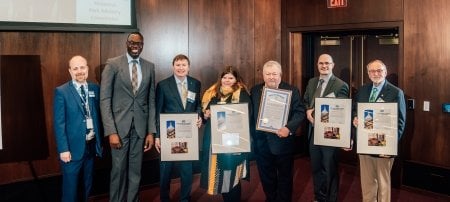New ESL Course Makes Life at Tech Easier for International Scholars' Spouses

“I have a trouble when I need to describe my goal in learning English. I came by chance to the US. Just destiny brought me here. I was not ready for this change. Without English, I felt hopeless, isolated and depressed. I saw the only chance to continue to be here was in learning a new language.” —Georgi Tsenov, Community English as a Second Language student, Bulgaria
When Georgi Tsenov came to Houghton from Bulgaria, he knew almost no English. He could say hello, goodbye, please, thank you and a few basic phrases, but not much more.
It’s a problem faced by many international scholars and their partners: social isolation due to a lack of English skills. But, thanks to a new seven-week Community English as a Second Language (ESL) course, Michigan Technological University staff and faculty are hoping to lessen the challenges faced by this unique group of campus community members.
A Global Reach
As word of Michigan Tech’s academics and research continues to reach around the world, new international faculty and researchers are arriving with increasing frequency. That’s great news for the Michigan Tech community but presents a challenge for those whose first language isn’t English.
“Attraction and retention of top faculty and researchers is a high priority for Tech, so we provide as many resources as we can to make their move smoother,” says Carrie Richards, dual career program coordinator in the Provost's office. An international move, paired with a language barrier, could easily result in feelings of social isolation—even for the most outgoing. But that’s where Richards saw a great opportunity.
“When we have international scholars coming to Tech, we recognize that their spouses’ happiness is equally important,” says Richards. “The Dual Career Program helps spouses find jobs and connections within the community. And one of the keys to their success is building language skills.”
Community ESL was announced early this fall, and quickly garnered almost 20 registered students from a multitude of nations—Nepal, Bangladesh, France, Iran, India, Turkey and others.
Customizable Course Work
The course was designed to cater to the students’ specific wants and needs, focusing on topics to help them integrate into the community, find a job and navigate their new cultural surroundings.
“On the first day of class, the students formed small groups and came up with learning priorities for the next six weeks,” says course instructor Frann Grossman. “Those priorities came from a list of challenges they had each mentioned on pre-class surveys. Every week, we chipped away at that list.”
Chief among the students’ concerns were social English (“party talk,” says Grossman), the language surrounding everyday business (like a trip to the grocery store or resolving a discrepancy on an electricity bill), understanding slang and the subtle differences inflection can play in sentence meaning.
One week of class was devoted to nuances of intonation, or “the music of English,” as Grossman explained to her class. “The way you raise or lower your pitch can show respect, formality, sarcasm, or any number of moods.” Things that are second nature for native English speakers, like the difference in meaning between “I didn’t need the money” and “I didn’t need the money” can pose considerable stumbling blocks for ESL students.
Learning by Doing
As anyone who has studied a second language can attest, there’s a lot to learn.
“But the real learning came outside of class,” Grossman says, “with me acting as a social involvement coach. Every student was responsible for getting involved in the campus or community in one form or another. My job is one of connections.”
Students were asked to complete a community involvement project and report back to their peers on the last week of class. Grossman wasn’t sure what types of results the assignment would produce, but the open-ended nature of the project allowed students to make it as related to their own needs as possible. Topics varied as widely as the student’s home nations; one student chose to chronicle her experiences working with contractors to remodel her kitchen, while another shared Mediterranean cooking recipes and tips with Tech staff and faculty at a healthy cooking class.
Winding Down and Looking Ahead
The final class drew a crowd. Students invited their spouses and partners for a get-together—complete with an international spread of snacks—where they presented their social involvement project results to a beaming group.
The course was such a success that funding has already been approved to conduct it again.
“When I met these students, I was overwhelmed with their talent and intellectual curiosity and their past experiences as global scholars and professionals,” Grossman says. “I am truly in total awe of all the students do.”
Michigan Technological University is an R1 public research university founded in 1885 in Houghton, and is home to nearly 7,500 students from more than 60 countries around the world. Consistently ranked among the best universities in the country for return on investment, Michigan's flagship technological university offers more than 185 undergraduate and graduate degree programs in science and technology, engineering, computing, forestry, business, health professions, humanities, mathematics, social sciences, and the arts. The rural campus is situated just miles from Lake Superior in Michigan's Upper Peninsula, offering year-round opportunities for outdoor adventure.




Comments